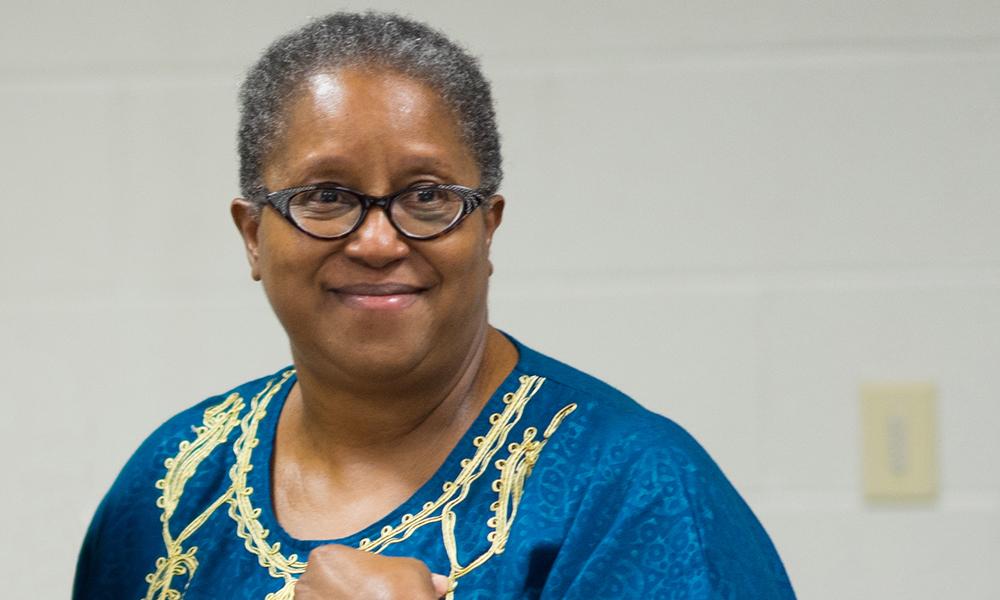A chat with the CHBS Diversity, Equity, and Inclusion (DEI) Director
News
SUMMARY: Social work professor BJ Bryson will serve as the inaugural CHBS Diversity, Equity, and Inclusion (DEI) Director. She will serve as the point person for DEI in cultivating a college climate that is inclusive and equitable. She shared some of her thoughts going into her new role.
What interested you about serving in this role?
Aspects of the DEI role are things I do as a good colleague and educator already. At the same point peers give me the opportunity to learn from their experiences as well. I am always ready to have a discussion about issues of diversity or inclusion efforts and to provide insight where I can. I am direct, intentional, and unapologetic for who I am and what I have come to know about being diverse in predominately white institutions. Some people experience me as rude, but if you ask me a question, I will give you my answer, never speaking beyond my knowledge base. I never suggest answers will make you feel comfortable. Everyone is in charge of their emotional life and I don’t try to manage things I have no control over. DEI work is hard, there is tensions related to change but with positive energy and seeing the best in all we can move forward. That does not always come in the moment. These are reflections from being in a department that struggles constantly with issues of diversity and inclusion as part of our profession.
I’ve engaged diversity work since early in my career as a national diversity trainer before I came into the academic world. Mentoring and encouraging are central to my being because I want more diverse peers and students to succeed. My standard is excellence. I tell diverse students I want you to replace me. Nobody ever said this to me, I stumbled into academia. As a first-generation undergraduate student from the Appalachian region, it would have been easy for people to write me off years ago. I understand that achieving in higher education is more about opportunities and being able to take advantage of these opportunities. This does not come without risk or sacrifice. But I keep my eye on the prize, which for me is a better world for all.
What duties will this role encompass?
The major duties of the DEI Director will be to serve on the Leadership Council and DEI Council, work with units within the college on setting goals and priorities, and serve as the CHBS DEI Ombudsperson. The DEI Director role focuses across the areas of students, staff, and faculty. In working with units we will develop action plans, timelines, and define accountability processes. With the CHBS leadership and DEI Council we have established five domains of focus: faculty and staff, students, curriculum, spaces, and community.
As CHBS DEI Director I look forward to serve in this capacity and working with others to achieve the larger college goal.
What do you hope to accomplish in this role?
My vision of the DEI Director role is as a facilitator for the college. Anything that gets accomplished in CHBS will be the work of engaged units and individuals working to foster a more expansive vision of what the college can become. No one person can change an institution. I’m here to assist. From Provost Coltman’s anti-racist and anti-discrimination agenda distributed earlier this semester, I hope to follow her lead in “cultivating a college climate that is inclusive and equitable”.
I hope to accomplish a greater awareness and foster change based on new perspectives gained from a multitude of places. Since coming to JMU I have constantly asked the question – “Are you ready?” for the changes in demographics that are coming. See Census Bureau recent report - https://www.census.gov/content/dam/Census/library/publications/2020/demo/p25-1144.pdf
The demographic changes are here. Three quick points – 1) Non-Hispanic whites are projected to remain the single largest race or ethnic group for the next 40 years; 2) One of the fastest growing population groups is mixed race/multiple race people; & 3) The proportion of younger people will be fewer while older persons will need to be a focus. The world has grown smaller with technology and the realities of international connections are more in the forefront. Awareness of challenges for international colleagues and students requires our attention. Awareness of the LGBTQ* community suggests increase awareness of heteronormative processes, not just dismantling systemic structural racism. And when it comes to dis“ability”, we are challenged to consider how we might embrace universal design in our efforts. Our awareness should move to a focus on the humanity of every member of our college and afford them dignity, worth and respect. The burden of invisibility should not rest with the marginalized but become all of our responsibility to make it safer for all to do more than survive.
CHBS is made up of helping professions. We need to tool for and prepare students for the world that is, not for the world that is passing. The Harrisonburg community is a great example of a community we can learn from in mutually serving partnerships.
What can be accomplished is only limited by our will and vision. Where there are road blocks we need to be flexible, creative problem-solvers. Nobody gets everything they want. Change is always happening whether we are engaged with it or not. The goal of accomplishment rests with all of us and I invite the CHBS community to the work.
Will you continue to teach?
<Yes, I will continue to teach in the Social Work Department and in the Family Studies Minor under the area of Gerontology.
